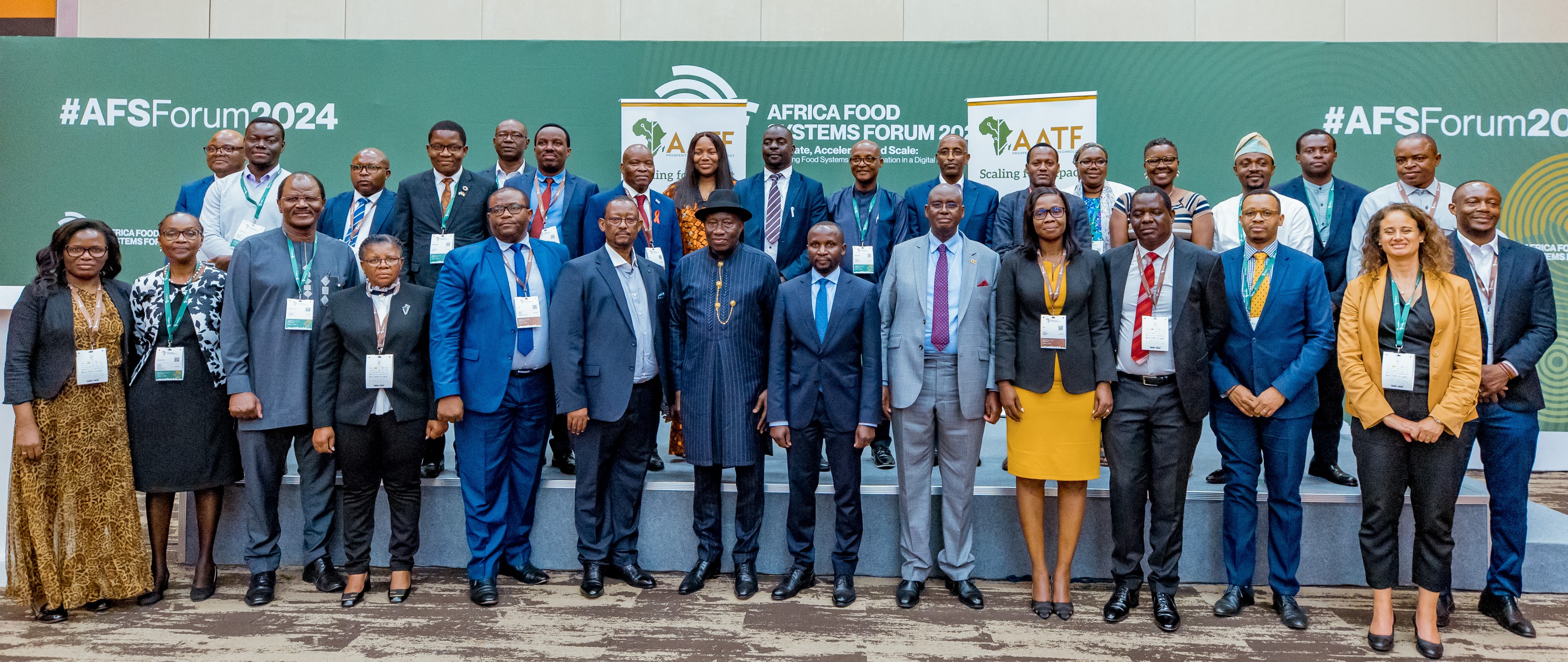
[Kigali, Rwanda, September 2024]: African governments have been urged to prioritise investment in biotechnology research and development to address pressing challenges in the sector, including climate change, pests and diseases, and declining soil fertility. The call was made to African Ministers from six countries, including Rwanda, Malawi, Mozambique, Zambia and Eswatini during a ministerial roundtable held on the sidelines of the African Food Systems in Kigali, Rwanda on 4 September 2024 to discuss the recommendations made by researchers on the role of political leadership in enhancing integration of modern biotechnology in Africa’s agricultural systems.
While addressing the ministerial roundtable, His Excellency Dr. Goodluck Ebele Jonathan, former President of the Federal Republic of Nigeria, and AATF Africa Ambassador for Agricultural Technologies advised that trust building is critical to integrating and utilising Science, Technology, and Innovation (STI) for Africa’s agricultural development.
“Trust is a crucial element, particularly in innovations including biotechnology aimed at enhancing food security, environmental sustainability, and economic development,” he said.
He noted that several African Governments had developed robust systems and policies, leading to the creation of transformative technologies in some countries.
“Our experts have the capability to develop technologies that will pass international health, safety, and environmental standards. We therefore need to trust our scientists, the institutional mechanisms and the regulatory frameworks,” he stated, adding that the idea of trust should extend to farmers by valuing their judgment and ensuring that technologies are delivered to them to make a meaningful difference in their lives.
Welcoming the Ministers to Rwanda, Hon. Dr. Ildephonse Musafiri, the Minister for Agriculture and Animal Resources, called for the need to define the national vision for STI for African countries. “Our countries need a clear, long-term vision for STI that aligns with regional development goals, unifies stakeholders and directs resources towards achieving specific outcomes,” said Dr. Musafiri.
He further reiterated the need for progressive policies that will support the vision of agricultural transformation including an enabling environment that allows STI to thrive. “The pathways towards that may require different actions that would entail the role of political leadership. Some of the issues that require engagement of political leadership include management of intellectual property rights, tax incentives for research and development, and development of facilitative regulatory processes,”he stated.
While presenting the researchers’ recommendations to the Ministers, Dr Canisius Kanangire, Executive Director of AATF, said Africa’s agriculture has the least integrated biotech applications due to inadequate investments for research, development and commercialisation of products. He noted that Africa’s agriculture requires investment from national budgets
“There is a need to increase funding for research and innovation through direct funding from national budgets on which private financing can leverage for greater and scalable impacts and research sovereignty,” said Dr. Kanangire.
He requested the Ministers to prioritise biotechnology capacity strengthening to train more local experts and provide incentives to undertake biotechnology entrepreneurship.
The call to action to the Ministers emanated from a three-day convening of African researchers who met in Kigali, Rwanda between 28-30 August 2024, where they deliberated on the state of agricultural biotechnology research in Africa. The researchers explored challenges and made recommendations for improvement.
In response to the researchers’ recommendations that countries need to increase investment in research, development, and commercialization, the Ministers also proposed strengthening extension services to manage misinformation on biotechnology. They further called for the conservation of Africa’s traditional germplasm and improved coordination of research across various institutions to help meet the target of allocating 10 percent of the national budget to research and development.
*********
For further information please contact:
George Achia, Communications Officer, East and Southern Africa, AATF; g.achia@aatf-africa.org, +254 785334163
*********
About AATF
AATF provides farmers in Sub-Saharan Africa (SSA) with practical technology solutions to overcome farm productivity constraints. Founded in 2003, AATF is driven by the vision of a prosperous, resilient, food and nutrition secure Africa, where smallholder farmers’ livelihoods are transformed through agricultural innovations. Active in 24 countries in East, Southern and West Africa, over the past two decades we have emerged as one of the continent’s foremost technology transfer facilitators, trusted by both private and public sector institutions. AATF works beyond the product development segment to help commercialise and scale sustainable, demand-based technologies designed to address specific agricultural challenges. Active across the whole technology lifecycle, we positively transform farmers’ livelihoods and lives. Above all, we believe in providing the ‘freedom to innovate’. AATF’s proven expertise as a programmes and partnership facilitator, weaving together a broad range of actors for technology transfer, is unparalleled in Africa. For more information, visit: https://www. aatf-africa.org
For more information, visit: https://www. aatf-africa.org


















































































